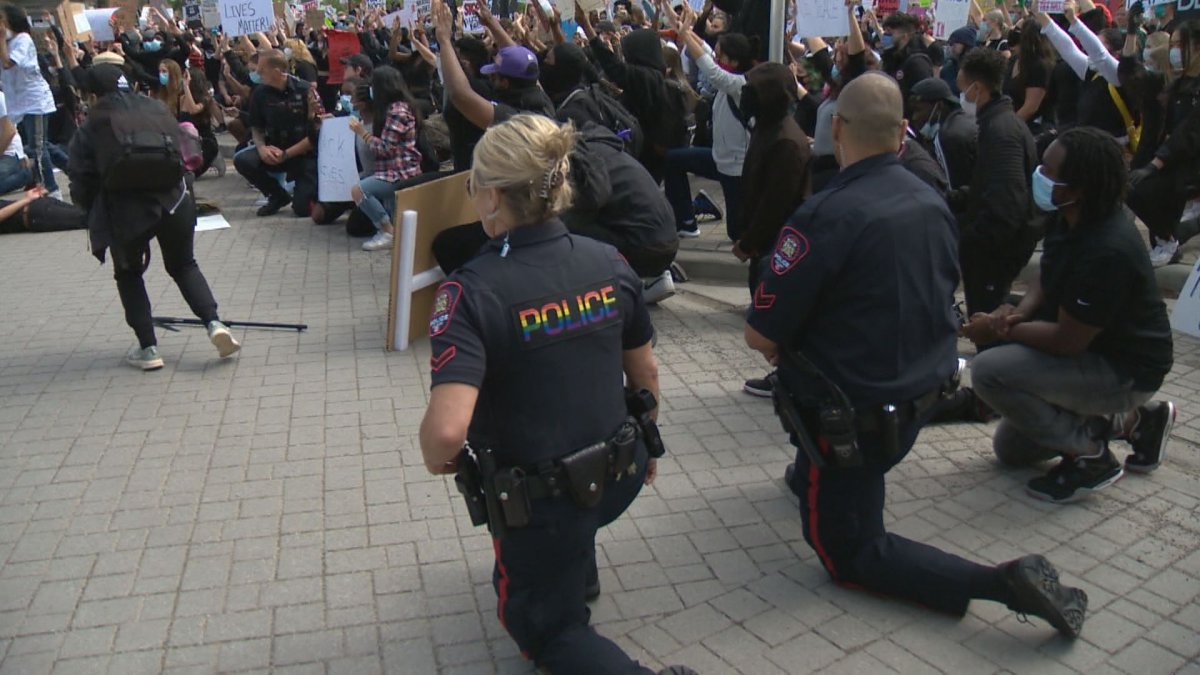With hundreds of cities across North America continuing to protest police brutality against Black people, the practices of the Calgary Police Service are being questioned — especially about restraining people in the same manner as George Floyd, a Black man who died in Minneapolis police custody on May 25.

“We would not expect our officers to be compressing the neck in that situation. Generally speaking, we teach our officers to — if they are going to be restraining somebody on the ground like that — to be placing their weight or their legs on the upper back area,” said Calgary Police Chief Mark Neufeld on Friday.
“Now let’s face it, sometimes if people are resisting, that whole interaction can be dynamic, but certainly, I don’t think that’s what we saw in Minneapolis.”
Neufeld said the policing model in the U.S. is different than in Canada.
“Officers are feeling, I think, some of the frustration of being lumped into one group or one category. Again, I think the model that we have here in Canada and in Alberta speaks for itself. I think we’re in a very good place with our relationships with our community and I think that shows in some of the things we’re seeing around people coming out to have their voices heard,” he said.
“I think it’s a difficult time. I think we all appreciate that what happened in Minneapolis and what’s happened in other cases is inappropriate and we’re all working to have those things not happen. I think we’re actually closer than probably many people think.”

The Rocky Mountain Civil Liberties Association that studied carding based on skin colour — finding that checkups were disproportionately greater in neighbourhoods that had more people of colour and poverty — said it is possible to remove these practices from policing as a whole.
“The solution to getting police services to improve and be better and to drop structural racism is somebody is going to have to work with them to absolutely ensure that policies and procedures and structures change,” president Kelly Ernst said.
He said Calgary policing has changed a lot over the past few decades — but that doesn’t mean the service can’t improve.
- Man in critical condition after setting himself on fire near NYC courthouse
- Arrest made after police issue emergency alert about ‘dangerous man’ in Bible Hill, N.S.
- Trump trial set to hear opening statements Monday as another delay denied
- Closing arguments presented in Michael Gordon Jackson abduction case
“I would hope the Calgary Police Service is trying to listen to that loud and clearly and really do a review of their practices so that the things that are going on in the U.S. or the things that may have gone on historically don’t repeat themselves here in Calgary,” Ernst said.
Following the use of force review in 2018, the Calgary police changed how they interact with Calgary’s racialized population.
The force said in a Facebook post on June 3 that it provides new recruits 30 hours of mandatory training on “being sensitive to the diverse needs of Calgarians, bias-free policing and de-escalating situations through open communication.”
CPS said officers are expected to complete ongoing training each year.
“They are currently required to retrain and demonstrate competence in high-risk use of force, such as firearms (every six months) and conductive energy weapon use (every two years),” it said.
“This year, we are expanding the mandatory annual retraining to include de-escalation techniques and the full range of physical control tactics. This will ensure officers are always equipped with the latest best practices to reduce the need for force at calls and minimize the level of force used if it must be applied.”
Supt. Leah Barber with the CPS Diversity Unit said the service offers a variety of training levels to officers, including an Indigenous component.
“We teach them about the different diverse cultures within Calgary and then we have different bias-free training that we offer online as well as in person,” she said, adding that levels after that explore more in-depth cultural awareness.
“We also have advisory boards, which each one of our diversity portfolios utilize members of the community that are willing to come in and help us as a service do better.”
Even though the CPS has improved its community-based policing in the past years, Ward 5 Coun. George Chahal said more can be done.
Chahal plans to bring the conversation of racial violence to the Public Safety Task Force, which he chairs.
“That’s an opportunity and an avenue to deal with violence in our city,” he said, adding that the focus of the task force is on guns and gangs.
“Also systemic racism is an important part of that discussion we’ll be having over the upcoming months.”
– With files from Global News’ Adam Toy



Comments